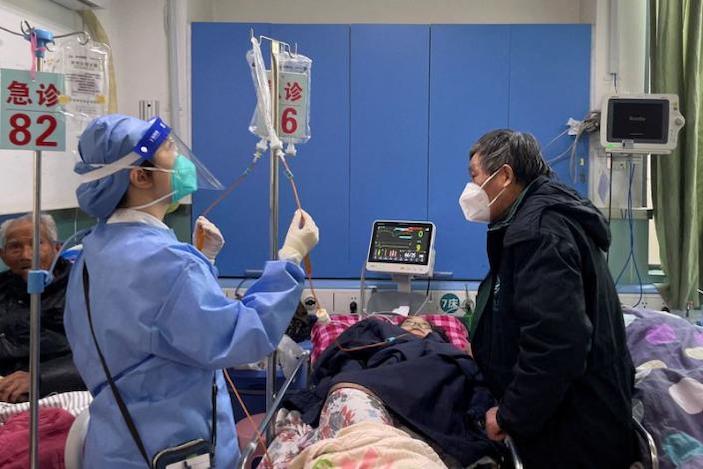President Xi Jinping has voiced concern about China’s Covid outbreak as travellers head to rural areas for the Lunar New Year break.
Xi’s comments on CCTV late on Wednesday come as travel ramps up during the busy holiday season, and warnings that deaths – believed to top half a million in the current wave – will peak over coming weeks.
Independent British-based health data and forecasting firm Airfinity warned on Tuesday that as many as 36,000 people could die each day in China from the disease.
Beijing said last Saturday that nearly 60,000 people with Covid died in hospitals between December 8 and January 12 – a vast jump on its earlier disclosures.
However, that number excludes people who die at home, and some doctors in China have said they are discouraged from putting Covid on death certificates. Citizens are also banned from taking photos or video recordings at cemeteries in some areas such as Tibet.
These are reasons why health experts say China’s official figures do not reflect the true toll of the virus.
“Based on the reports of hospitals being overwhelmed and long queues outside funeral homes, we might estimate that a larger number of Covid deaths have occurred so far, maybe more than 600,000 rather than just 60,000,” Ben Cowling, an epidemiologist at Hong Kong University, said.
A new and worrying factor is that healthcare workers in some cities, such as Shijiazhuang, are already reporting reinfections – a secondary wave – with citizens reporting much worse pain than their initial infection, according to a report by Radio Free Asia.
ALSO SEE:
US And China Must Not Let Competition Turn to Conflict: Yellen
Drugmakers ramp up fever medicines
While China has spent vast sums on Covid suppression, public security and defence in recent years, medical facilities in rural areas have remained in a relatively basic state and are said to be ill-equipped to deal with outbreaks.
It is five weeks since Xi’s government abruptly axed his strict “zero-Covid” controls that had largely shielded China’s 1.4 billion people from the disease for three years but sparked widespread protests in late November.
China’s chaotic exit from a regime of mass lockdowns, travel restrictions and frequent Covid testing, has also prompted a run on drugs as people fend for themselves against the disease.
To meet soaring demand, drugmakers in China are ramping up operations to triple their capacity to make key fever and cough medicines, the state-run China Daily reported on Thursday.
China has relied on domestic vaccines to combat the pandemic, eschewing foreign-made ones which some studies have suggested are more effective, while other foreign treatments for Covid-19 have been hard to come by in China.
Pfizer’s anti-viral Covid drug Paxlovid is available in China but has been very difficult to obtain through official channels, according to media reports and personal accounts. Merck & Co’s antiviral treatment molnupiravir has also been approved for use but is not yet widely available.
Those particularly vulnerable to the virus are the elderly, many of whom are not fully vaccinated and now face exposure as millions of urban workers travel to home towns to reunite with families for Lunar New Year holidays.
Before Covid first emerged in the central Chinese city of Wuhan in late 2019, the holiday was known as the greatest annual migration of people anywhere on the planet.
‘A time of stress’
“China’s Covid prevention and control is still in a time of stress, but the light is ahead, persistence is victory,” Xi said on Wednesday in a holiday greetings message carried by state broadcaster CCTV.
“I am most worried about the rural areas and farmers. Medical facilities are relatively weak in rural areas, thus prevention is difficult and the task is arduous,” Xi said, adding that the elderly were a top priority.
Several Chinese cities are set to celebrate the New Year with massive displays of fireworks after local governments reversed bans on their sale in recent years.
Hangzhou, Kunming, Zhengzhou, and Changsha – which all have populations above 10 million – will allow the sale of fireworks, according to the Yicai business magazine.
Airfinity on Wednesday estimated 62 million people could be infected with the virus between January 13-27 and that Covid-related deaths could peak at 36,000 a day on January 26, up sharply from previous forecasts.
“Our forecast estimates a significant burden on China’s healthcare system for the next fortnight and it is likely that many treatable patients could die due to overcrowded hospitals and lack of care,” Airfinity’s analytics director Matt Linley said.
- Reuters with additional editing by Jim Pollard
NOTE: Further details were added to this report on 19 January 2023.
ALSO SEE:
China’s Reopening Lifts Economic Growth Optimism: WEF Panel
China’s 2022 Growth of 3% Among the Worst in 50 Years
US Extends China Chip Curbs to Macau Over Tech Diversion Risk
Netherlands to Consult Japan, Taiwan on US-China Chip Curbs
US-China Rivalry May Spur Decoupling of Chip Sector – BBC
























